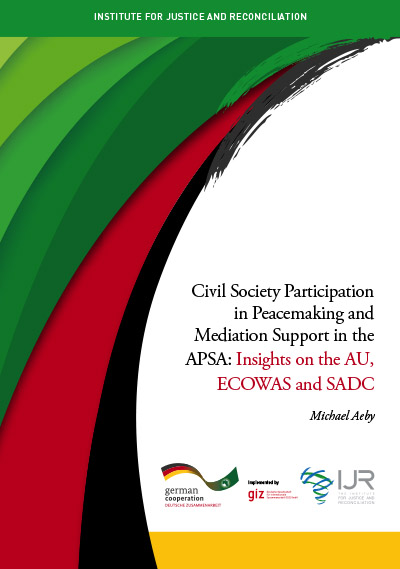Civil Society Participation in Peace-Making and Mediation Support in the African Peace & Security Architecture
 On 1 March, IJR launched the report on Civil Society Participation in Peace-Making and Mediation Support in the African Peace & Security Architecture (APSA), which IJR produced in partnership with the German Corporation for Development Cooperation. The online launch event featured ten speakers from African intergovernmental organisations, civil society, academia and development partners and was attended by over 70 guests.
On 1 March, IJR launched the report on Civil Society Participation in Peace-Making and Mediation Support in the African Peace & Security Architecture (APSA), which IJR produced in partnership with the German Corporation for Development Cooperation. The online launch event featured ten speakers from African intergovernmental organisations, civil society, academia and development partners and was attended by over 70 guests.
The report focuses on the African Union (AU), Economic Community of West African States (ECOWAS) and Southern African Development Community (SADC). It examines three critical issues:
- The development of mediation support structures, which serve to institutionalise professional mediation capacity and fill a gap in the APSA.
- The role of African peacebuilding NGOs in developing the mediation capacity of the APSA.
- The inclusion of local civil society stakeholders from conflict-affected countries in peace negotiations that the AU, ECOWAS and SADC mediate.
The report shows that the three organisations have elaborated different policy guidelines for civil society participation. Inclusivity is a mediation principle of the AU and ECOWAS, but the application of mediation guidelines depends on the will of high-level mediators, political decision-makers and conflict parties. Participation in APSA pillars for early warning, conflict prevention and decision-making varies sharply, and rendering the organisations’ official civil society interfaces into viable channels to participate in peace-making is a formidable challenge.
The report finds that NGOs decisively contributed to establishing mediation support structures by providing expertise and drafting instruments. However, African leadership was limited as few African NGOs specialise in mediation support. The AU, ECOWAS and SADC partner with African NGOs to provide mediation training to state and non-state actors. Since the establishment of internal knowledge-management systems to draw comparative lessons from mediations requires tremendous research capacity, the report recommends that the organisations partner with African peace research institutes to create a hybrid system. Experts from peacebuilding NGOs can be put on standby to advise mediators on the design of peace processes and agreements.
The inclusion of local civil society stakeholders in peace negotiations is meant to enable inclusive agreements and sustainable peace. However, their inclusion can complicate mediations and encounters resistance by powerful conflict parties. APSA mediators generally consult civil society stakeholders, but the inclusion of their concerns in negotiation agendas remains challenging. Mediation support structures can promote inclusive peace process designs and streamline consultations to make civil society stakeholders heard.
Michael Aeby, PhD, IJR Research Consultant in the Peacebuilding and Interventions Programme
